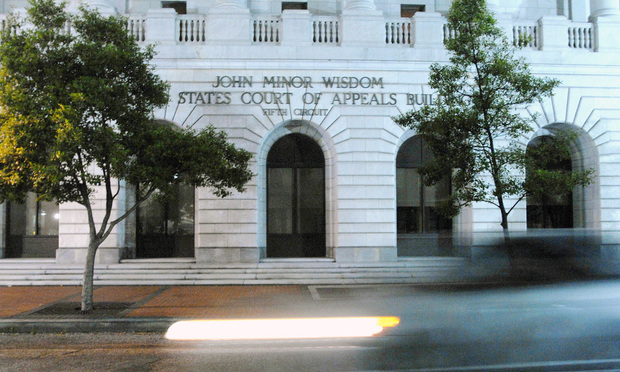Fifth Circuit Sanctions Austin Attorney for Filing Frivolous Appeal
Austin solo Omar Rosales, who already had been hit with more than $175,000 in sanctions for making false and abusive statements about opposing counsel during Americans with Disabilities Act litigation, faces additional sanctions.
May 07, 2018 at 02:30 PM
3 minute read

Austin solo practitioner Omar Rosales, who already had been hit with more than $175,000 in sanctions for making false and abusive statements about opposing counsel during Americans with Disabilities Act litigation, faces additional sanctions.
In a May 4 decision in Phil's Icehouse Inc., et al. v. Jon R. Deutsch, a three-judge panel the U.S. Court of Appeals for the Fifth Circuit awarded $60,522.91 in attorney fees and expenses to six defendants who had been sued by Deutsch, who has been represented Morales. That amount is for the cost of defending the appeal.
Clark Richards, an appellate attorney representing the six defendants, said that in his experience, an appellate court awarding such sanctions is fairly rare.
“I have never had it happen in a case I've worked on,” Richards, a partner in Austin-based Richards Rodriguez & Skeith, said.
The panel noted in its per curiam opinion that under Federal Rule of Appellate Procedure 38, a court of appeals “may award 'just damages and single or double costs' for an appeal that is frivolous, meaning the result is obvious or the arguments of error are wholly without merit'.”
As the panel further noted, “Although it might have been possible for Rosales to raise genuine legal arguments, he has not done so. Instead, his appeal was plagued with references to unrelated areas of law, mischaracterizations of the record and the law, and missing citations.”
In December 2016, U.S. Magistrate Judge Mark Lane of the Western District of Texas had sanctioned Rosales in six ADA lawsuits after finding that he had “defamed opposing counsel with false and abusive statements, attempted to derail the administration of justice with frivolous motions and submitted fabricated evidence” to subvert proceedings in the federal district court. U.S. District Judge Lee Yeakel of the Western District concluded that Rosales acted in “bad faith” in a March 2017 decision.
In his brief to the Fifth Circuit, Rosales wrote: “Counsel posits that the Magistrate and District Court were engaging in extreme judicial activism in an attempt to stop and chill ADA litigation.”
The Fifth Circuit affirmed the sanctions against Morales in March of this year, noting there “was no serious doubt” that requirements for the district court's sanctions were met.
In its May 4 opinion, the Fifth Circuit wrote: “It is not simply the fact of the appeal, but the manner in which Rosales conducted it, that merits sanctions.” For that reason, it directed that Rosales, not Deutsch, is liable for these sanctions, the panel wrote in a footnote.
Clark said the Fifth Circuit's opinion affirming the trial court's original sanctions noted that Rosales had misstated the law and the facts in his brief.
“That was a signal to us they might grant sanctions,” he said.
Rosales responded to a request for comment with the following emailed statement:
“I will be filing an appeal to the Supreme Court of the United States. Needless to say, I am disappointed with this decision. I have filed over 65 appellate briefs at the Fifth Circuit, with four victories. Three of those victories involved ADA cases. And none of my appeals have ever been deemed frivolous.”
This content has been archived. It is available through our partners, LexisNexis® and Bloomberg Law.
To view this content, please continue to their sites.
Not a Lexis Subscriber?
Subscribe Now
Not a Bloomberg Law Subscriber?
Subscribe Now
NOT FOR REPRINT
© 2025 ALM Global, LLC, All Rights Reserved. Request academic re-use from www.copyright.com. All other uses, submit a request to [email protected]. For more information visit Asset & Logo Licensing.
You Might Like
View All

Holland & Knight Hires Former Davis Wright Tremaine Managing Partner in Seattle
3 minute read
Supreme Court Reinstates Corporate Disclosure Law Pending Challenge

Trending Stories
- 1No Two Wildfires Alike: Lawyers Take Different Legal Strategies in California
- 2Poop-Themed Dog Toy OK as Parody, but Still Tarnished Jack Daniel’s Brand, Court Says
- 3Meet the New President of NY's Association of Trial Court Jurists
- 4Lawyers' Phones Are Ringing: What Should Employers Do If ICE Raids Their Business?
- 5Freshfields Hires Ex-SEC Corporate Finance Director in Silicon Valley
Who Got The Work
J. Brugh Lower of Gibbons has entered an appearance for industrial equipment supplier Devco Corporation in a pending trademark infringement lawsuit. The suit, accusing the defendant of selling knock-off Graco products, was filed Dec. 18 in New Jersey District Court by Rivkin Radler on behalf of Graco Inc. and Graco Minnesota. The case, assigned to U.S. District Judge Zahid N. Quraishi, is 3:24-cv-11294, Graco Inc. et al v. Devco Corporation.
Who Got The Work
Rebecca Maller-Stein and Kent A. Yalowitz of Arnold & Porter Kaye Scholer have entered their appearances for Hanaco Venture Capital and its executives, Lior Prosor and David Frankel, in a pending securities lawsuit. The action, filed on Dec. 24 in New York Southern District Court by Zell, Aron & Co. on behalf of Goldeneye Advisors, accuses the defendants of negligently and fraudulently managing the plaintiff's $1 million investment. The case, assigned to U.S. District Judge Vernon S. Broderick, is 1:24-cv-09918, Goldeneye Advisors, LLC v. Hanaco Venture Capital, Ltd. et al.
Who Got The Work
Attorneys from A&O Shearman has stepped in as defense counsel for Toronto-Dominion Bank and other defendants in a pending securities class action. The suit, filed Dec. 11 in New York Southern District Court by Bleichmar Fonti & Auld, accuses the defendants of concealing the bank's 'pervasive' deficiencies in regards to its compliance with the Bank Secrecy Act and the quality of its anti-money laundering controls. The case, assigned to U.S. District Judge Arun Subramanian, is 1:24-cv-09445, Gonzalez v. The Toronto-Dominion Bank et al.
Who Got The Work
Crown Castle International, a Pennsylvania company providing shared communications infrastructure, has turned to Luke D. Wolf of Gordon Rees Scully Mansukhani to fend off a pending breach-of-contract lawsuit. The court action, filed Nov. 25 in Michigan Eastern District Court by Hooper Hathaway PC on behalf of The Town Residences LLC, accuses Crown Castle of failing to transfer approximately $30,000 in utility payments from T-Mobile in breach of a roof-top lease and assignment agreement. The case, assigned to U.S. District Judge Susan K. Declercq, is 2:24-cv-13131, The Town Residences LLC v. T-Mobile US, Inc. et al.
Who Got The Work
Wilfred P. Coronato and Daniel M. Schwartz of McCarter & English have stepped in as defense counsel to Electrolux Home Products Inc. in a pending product liability lawsuit. The court action, filed Nov. 26 in New York Eastern District Court by Poulos Lopiccolo PC and Nagel Rice LLP on behalf of David Stern, alleges that the defendant's refrigerators’ drawers and shelving repeatedly break and fall apart within months after purchase. The case, assigned to U.S. District Judge Joan M. Azrack, is 2:24-cv-08204, Stern v. Electrolux Home Products, Inc.
Featured Firms
Law Offices of Gary Martin Hays & Associates, P.C.
(470) 294-1674
Law Offices of Mark E. Salomone
(857) 444-6468
Smith & Hassler
(713) 739-1250






